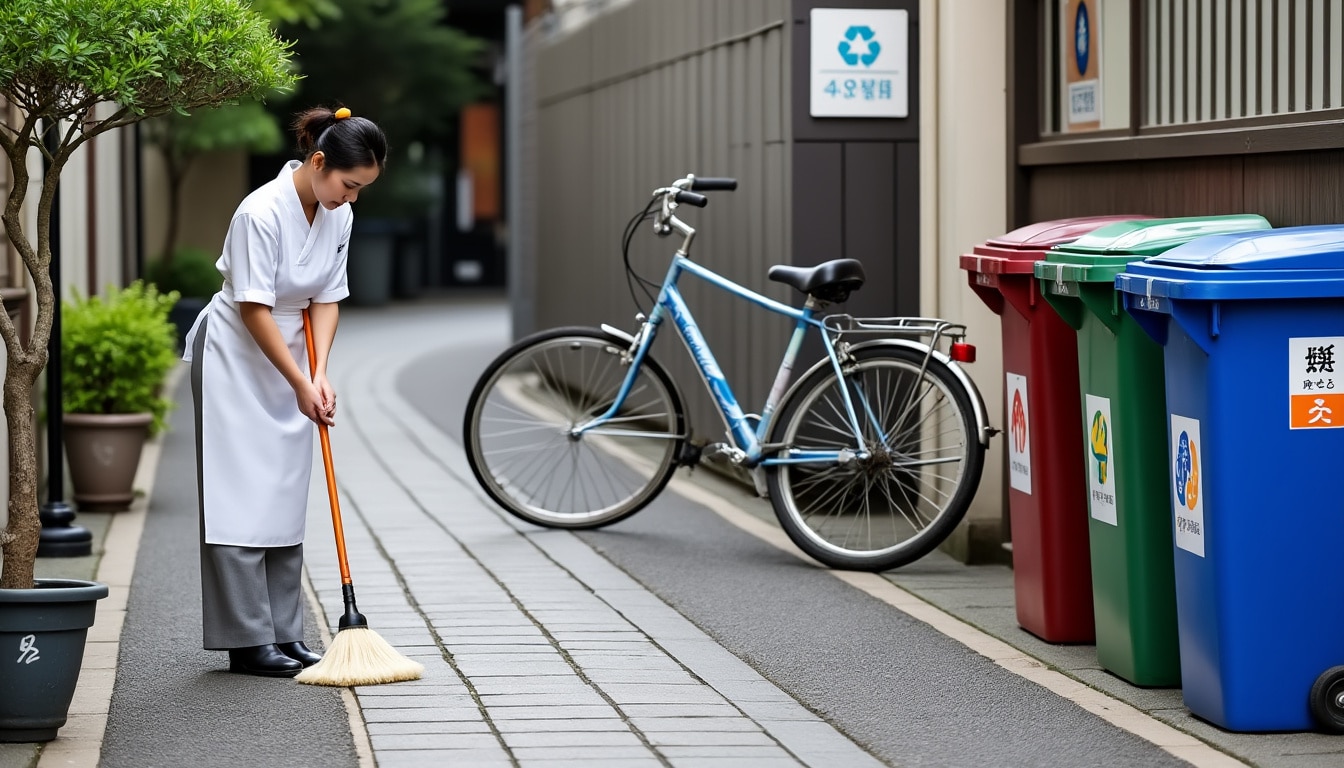Chiba, nestled in the heart of Japan, serves as a paragon of urban cleanliness and impeccable hygiene practices. Famed as a metropolitan hub, this city exemplifies how cleanliness is woven intrinsically into the social fabric, from bustling streets to serene parks. The harmony achieved through traditional customs and modern waste management systems is admirable. While many factors contribute to Chiba’s cleanliness, a blend of cultural ethos and systemic approaches in personal and public hygiene are most influential. Exploring these dynamics, we can glean valuable insights into how simple green practices and natural cleaning solutions play an integral part in maintaining Chiba’s pristine environment.
The Cultural Significance of Cleanliness in Chiba
Chiba’s focus on cleanliness is not merely a compliance with public policy but a cultural hallmark borne out of deep-rooted traditions. The practice of regular cleanliness and hygiene dates back centuries, influenced by the purifying rituals of Shintoism, where purity and cleanliness form the core beliefs. This ancient perspective persists today, impacting societal behavior, from schools to city streets.
Ritualistic cleaning often starts at home, where removing shoes before entering is standard. This practice prevents outdoor dirt from disrupting the sanctity of home interiors. Many homes also adopt air purifiers and natural cleaning solutions from brands like P&G and Seventh Generation to ensure a healthy living space. The use of products like Clorox and Lysol is commonplace for disinfecting surfaces, reflecting a blend of traditional respect for cleanliness and modern hygiene standards.
The communal aspect of cleanliness extends beyond private spaces. In public areas, it’s not unusual to see citizens collectively participate in “cleaning days,” where entire neighborhoods join hands to tidy their localities. Such practices foster a strong sense of community and instill a public duty towards environmental hygiene, symbolizing Mr. Clean’s philosophy of a sparkling environment. These efforts are vital, especially in densely populated urban settings where maintaining hygiene poses unique challenges.
Moreover, social norms strictly oppose littering. It is common to find citizens carrying personal trash home if garbage bins are not available. This habit reduces littering and reinforces a sense of personal accountability. Such individualized actions culminate in the collective achievement of a clean city, akin to a well-executed natural cleaning solution in harmony with the environment.

Cultural Practices, Rituals, and Community Involvement
Community engagement in Chiba is reflective of broader Japanese norms that emphasize cleanliness. Various cultural practices, such as periodic neighborhood clean-ups and student participation in school sanitation, underline the importance of communal work. Public service announcements are also a staple, serving as reminders of hygiene habits and advocating practices akin to Healthy Home initiatives.
- 🚮 Community-cleaning events: Engages residents in collective efforts.
- 👟 Shoe removal: Maintains indoor cleanliness and reverence.
- 🧼 Use of eco-friendly cleaning products: Supports natural solutions.
- 🎒 Carrying personal trash home: Enhances public responsibility.
These practices demonstrate a community’s dedication to sustainability and hygiene. As such, Chiba remains a prime example of how cultural values can elevate a city’s approach to cleanliness and environmental health.
Structured Waste Management in Chiba
Chiba’s waste management strategies reflect Japan’s broader commitment to cleanliness. With organized and stringent waste disposal systems, the city ensures minimal pollution and maximum recycling. Households in Chiba receive detailed guidelines on waste separation, from plastics to paper, ensuring each item serves a recyclable purpose. The precision with which waste is categorized and collected mirrors the high standards set by waste management frameworks globally.
This dedication to cleanliness is evident in the cleanliness of public spaces. Streets lack common waste receptacles, encouraging residents to dispose of waste at home. Public transportation systems also advocate this ethos, with minimal littering and the use of individual trash bags on buses illustrating structured waste-reducing techniques.
Additionally, businesses in Chiba play a role by limiting excessive packaging materials and opting for recyclable and biodegradable options, thereby supporting healthier environmental practices. This enterprise-level involvement forms part of an overall initiative to maintain cleanliness across all societal levels.
| 💡 Category | 🏙️ Household Waste | Public Waste | ♻️ Recycling Handling |
|---|---|---|---|
| Burnable | ✅ Yes | ❌ No bins | Processed |
| Non-burnable | ✅ Yes | ❌ No bins | Processed |
| Plastic | ✅ Yes | ❌ No bins | Recycled |
| Glass/Bottles | ✅ Yes | ❌ No bins | Recycled |
Thus, the structure of waste management in Chiba is an intricate and sincere effort combining cultural habits, technological advancements, and civic responsibility to maintain the cleanliness for which the city is known worldwide.
Air Quality and Pollution Control in Chiba
A key component of Chiba’s cleanliness is robust pollution control. With an impressive air quality index, Chiba showcases how urban areas can combat pollution effectively. This success comes from the adoption of initiatives that curtail emissions, thereby promoting a cleaner atmosphere.
Governance plays a critical role through strict regulations geared towards both emission reduction and industry compliance with environmental standards. The utilization of advanced technologies, similar to methods employed by eco-friendly companies such as Method and Dettol, is integral to pollution minimization strategies.
Moreover, educational campaigns focus on the detrimental health impacts of pollution, advocating for greener lifestyle choices among citizens. This proactive stance fosters a widespread understanding of environmental health, pivotal in achieving lower pollution levels.
Despite the achievements, Chiba remains proactive. It implements a blend of historical practices and futuristic applications to maintain low pollution levels, complemented by a moderate noise and the presence of significant green zones which contribute positively to the urban environment.
- 🌳 Extensive green spaces: Encourage ecological balance.
- 🚗 Strict vehicular emission standards: Ensure reduced pollution.
- 🏭 Industrial compliance: Aligns with international environmental norms.
- 🔄 Continual monitoring and adjustment: Facilitates response to environmental changes.
Educational Initiatives for Promoting Hygiene
The empowerment of younger generations through education is crucial to Chiba’s cleanliness philosophy. Schools in Chiba are designed to reinforce habits that reflect public hygiene and community care. Students engage in regular school cleaning activities to uphold sanitation standards, akin to the standards set forth by global hygiene brands like Lysol and Mr. Clean.
The curriculum integrates lessons about hygiene and responsible waste management, offering knowledge that extends beyond academics and into daily life practices. This setup ensures that Chiba’s dedication to cleanliness is not only upheld but expanded with each new generation.
Public spaces, on the other hand, often serve as educational platforms. Signage around the city provides tips on hygiene and proper waste disposal, ensuring both residents and visitors commit to clean practices.
Chiba’s commitment to education serves as a model. By instilling respect for cleanliness and community involvement from an early age, the city ensures its clean legacy remains a vibrant part of its future.
| Educational Area | Topics Covered | Practical Application |
|---|---|---|
| School Hygiene | Cleanliness, Importance of Sanitation | Regular classroom cleaning |
| Community Engagement | Waste Management, Social Responsibility | Participation in community clean-ups |
| Environmental Awareness | Pollution Control, Recycling | Eco-friendly initiatives |
FAQ on Hygiene in Chiba
Here are some frequently asked questions about cleanliness and hygiene practices in Chiba:
- 🧼 What cleaning brands are popular in Chiba?
Brands such as P&G, Clorox, and Mr. Clean are widely used for their effectiveness and reliability. - 🌿 How does Chiba manage waste effectively?
Chiba employs a strict waste management system that encourages recycling and reduces littering through community education. - 🌱 Are eco-friendly practices encouraged in Chiba?
Yes, eco-friendly solutions like Seventh Generation are encouraged to promote sustainability along with maintaining cleanliness.

Whether you’re a first-time visitor or a seasoned traveler, ensuring a safe and memorable journey to Chiba is paramount. Chiba, renowned for its rich history, beautiful landscapes, and vibrant culture, attracts tourists worldwide. As Japan’s sixth-largest city and a significant…

Chiba, nestled adjacent to Tokyo, is a city that often charms visitors with its harmonious blend of urban livelihood and coastal tranquility. Known for its thriving local culture and nature amusements, Chiba also prides itself on being a place where…

Pickpocketing and theft in Chiba
Chiba, a vibrant and bustling area known for its rich cultural heritage and close proximity to Tokyo, is unfortunately no stranger to issues of pickpocketing and theft. Over the years, this concerning trend has seen significant variations, prompting local authorities…

Protests and social unrest in Chiba
The city of Chiba, known for its vibrant cultural landscape and close proximity to Tokyo, has recently found itself in the spotlight for less celebratory reasons. As the year 2025 unfolds, a series of social tensions and protests have erupted,…

Safety in Chiba for travelers from different countries
🌏 Chiba, a neighboring prefecture to Tokyo, is a vivid blend of modern attractions and natural beauty that continues to interest travelers from all corners of the globe. But as with any travel destination, understanding local safety nuances is crucial…


